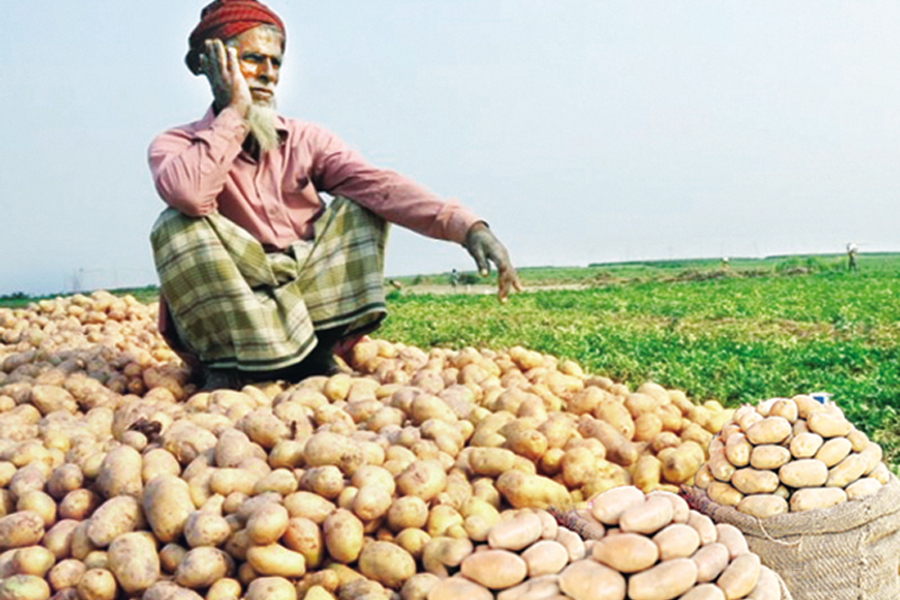
Published :
Updated :

Farmers in this country could not be more discriminated against. Growers of major crops appear to be only more so. This year potato farmers have produced a record high of 13 million tonnes of potato---4.0 million tonnes in excess of the country's demand. Only 70,000 tonnes have so far been exported. The price never picked up, although at the start of the new harvest even in the country's growing north, the price of potato was Tk 70-80 a kilo. From then on the price has steadily slumped. Now farmers are counting losses between Tk 10-12 a kilogram of potato because production costs varied between Tk14-17 and with the addition of cold storage rent, the total cost for preservation of a kilogram of potato comes to about Tk25. But at the moment, the going price at cold storage gate is Tk 12-13 a kilogram.
This has raised the ominous spectre of farmers' unwillingness to take release of a huge quantity of potato from cold storages. Taking out the stock from cold storages and then bearing the costs of transportation will further increase the margin of loss. Similar things happened years ago when potatoes were left to rot or used as cattle feed. Frustration of potato growers this year may surpass the extent of that time. Fearing the reaction from potato farmers, the Bangladesh Cold Storage Association (BCSA) has sent a letter to the ministry of commerce (MoC) urging it to fix at least Tk25 a kilogram at the cold storage gate. The association has, moreover, suggested an alternative way of pragmatic disposal of potato. With the rice given to 5.5 million vulnerable families in the country at Tk 15 a kilogram, 10 kilogram of potato can as well be given to those families at a subsidised rate.
Its benefit will be manifold. First, the vulnerable people will get potatoes at a cheaper rate and will have their nutritious supplement all the same. Again, potato growers will at least be spared the outrageous losses they are now incurring. Apart from this immediate measure, the MoC should look for market abroad in order to export as much potato as possible. There are still three more months when this crop, a staple in some parts on this planet, will pass a lean season before the new harvest can be expected in November. If the opportunity can be exploited, the domestic potato glut can be overcome to a large extent.
Strangely, government intervention is fast and furious if any such appeal comes from the corporate world or the monopolistic trading houses. For example the Bangladesh Rice Industries Association (BRIA), a group of top auto rice millers, sent a letter to the MoC pleading for rescinding the directive issued by the Directorate of National Consumers' Rights Protection (DNCRP) on the sale of rice under fictitious names---in fact given the name of 'miniket' and 'jeerashail'. This is a kind of ultra-polished rice made from BRRI Dhan 28 and 29. In fact, BRRI Dhan 29 has lower yield and it is mostly the BRRI Dhan 28 that is used for the purpose. In no time, the MoC obliged. But in case of the appeal to save potato farmers, no prompt action is visible even though the plight of these growers has long been highlighted by the media and agriculture experts. The apprehension is not misplaced that farmers will lose interest in cultivation of potato and next year, the price of the item may hit rooftop as it did last year.
In case of rice, the BRIA has used the intimidation tactics threatening not to purchase 5.0 million tonnes of paddy from farmers to be processed as the finer variety of rice. If it is not purchased, farmers will count losses as that amount of rice will rot in the process. Wonder of wonders, the BRIA has at no point made it clear that it does not polish BRRI Dhan 28 to give it the name 'miniket". The DNCRP acted on an ethical and legal issue in order to prevent auto rice millers from resorting to the malpractice with the staple and abuse of the legal provision. By cutting it to size, the MoC has dealt a heavy blow to the institutional status such government agencies should have.
The problem here is the government attitude. If the earlier regime's constraints owed to graft and commission money, this government's week-kneed responses to issues of vital importance have mostly gone against the voiceless, farmers, workers and the marginalised finding themselves increasingly at the receiving end. Now the question is, will the farmers whose cause the BRIA has advanced as an excuse for allowing them to continue marketing 'miniket' and 'jeerashail' receive any benefit from the move? They are hardly likely to. The difference between the price of BRRI Dhan 28 and that of so-called 'miniket' or 'jeerashail' is no less than Tk20, if not more.
Had there been a pro-farmer and pro-people government, it would never have given in to the irrational and illegal demand from the corporate world. A government has to be smart to outdo machinations of the business syndicates. If it procured enough paddy and rice and had built sufficient warehouses and cold storages for rice and potatoes, the excess production would not be a cause for concern but an asset for the national economy.


 For all latest news, follow The Financial Express Google News channel.
For all latest news, follow The Financial Express Google News channel.